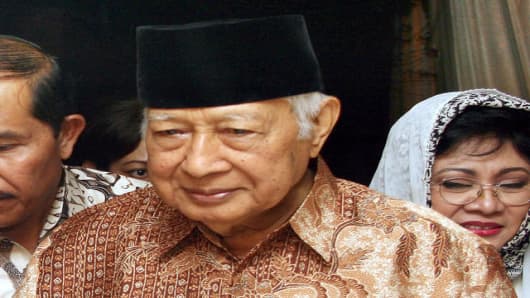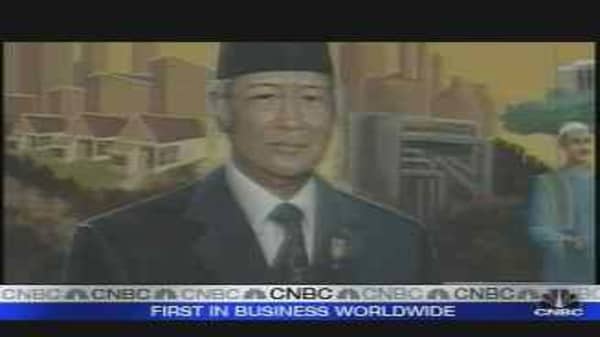Indonesia's former president Suharto, whose iron-fisted rule became a byword for corruption and bloody repression but also brought economic growth, died Sunday after a long and public fight for life.
His death at the age of 86 came more than three weeks after he was admitted to hospital with heart, lung and kidney problems, surprising doctors with his resilience.
"Father has returned to God," his eldest daughter, Siti Hariyanti "Tutut" Rukmana, breaking down in tears, told reporters outside.
"We ask that if he had any faults, please forgive them... may he be absolved of all his mistakes." His team of doctors said Suharto suffered multiple organ failure overnight.
He was resuscitated but died at around 1:10 p.m. local time.
President Susilo Bambang Yudhoyono expressed his sorrow and asked people to pray for the late strongman.
"I also would like to call on the people of Indonesia to show the highest respect to one of the nation's best sons, a great leader of the nation who has contributed so much service and dedication to the nation and the state." The flag at the presidential palace was lowered to half mast, and Cabinet Secretary Sudi Silalahi announced a seven-day mourning period.
A presidential spokesman said Yudhoyono would lead Monday's funeral ceremony at the family grave near Solo, Central Java, where Suharto will be buried next to his wife of 48 years, Siti Suhartinah, who died in 1996.
Suharto was a ruthless dictator whose success presiding over huge economic progress was overshadowed by his legacy of bloodshed, human rights abuses and corruption on a colossal scale.
His tenure was marked by repression, from the killings of at least half a million communists and their sympathizers after the abortive coup that saw him seize power in 1966, to invading East Timor and quelling separatist movements in Aceh and Papua.
At the same time, Suharto steered the sprawling archipelago nation through an economic boom, making it notably self-sufficient in rice. For many people here, he became known as the father of development.
However, billions of dollars ended up in the hands of friends and relatives as cronyism and corruption ran riot, and he eventually stepped down in 1998, rocked by deadly riots and mass pro-democracy protests triggered by the Asian economic crisis.
After leaving office he dropped out of public view while avoiding criminal trial for massive corruption allegations by citing poor health. Doctors said two strokes left him with some permanent brain damage.
Efforts to bring him to justice for alleged human rights atrocities in East Timor, which he invaded in 1975, as well as Aceh and Papua, were stymied by a lack of evidence.
"We could not have expected a leader for Indonesia worse than Suharto. But he was no Pol Pot," said Asmara Nababan, head of the Centre for Democracy and Human Rights in Jakarta.
All Suharto's six children had gathered Sunday at his deathbed, the former president's close aide, Moerdiono, said earlier.




